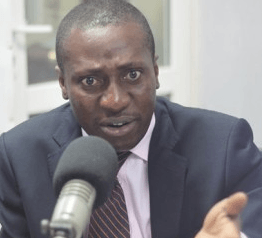It does look like the minority leader in the current Parliament, Alexander Afenyo-Markin has embarked on a mission not consistent with what should be building the country’s democracy.
He must know that, in the country’s rich political history, the nation has witnessed both triumphs and tribulations in its quest for a consolidated democracy. From the euphoric moments of independence under Kwame Nkrumah’s leadership in 1957 to the tumultuous periods of military rule and instability, the country’s democratic journey has been a twisting path, paved with complications and hard-won victories.
It is against this backdrop that recent actions and statements of Afenyo-Markin, must be examined. His dismissive attitude towards the ruling NDC’s parliamentary majority and his accusations of scheming against the Speaker, Rt. Hon. Kingsford Alban Sumana Bagbin, have raised alarm bells among those committed to upholding democratic principles and fostering a culture of political tolerance.
Afenyo-Markin’s description of the NDC’s formidable majority, bolstered by the support of independent MPs, as “so-called” is a blatant disregard for the will of the electorate. With 183 seats, the NDC commands a majority that surpasses the two-thirds threshold, a reality that Afenyo-Markin seems unwilling to accept. This dismissive rhetoric not only undermines the legitimacy of the ruling party but also strikes at the heart of democratic principles, disregarding the constitutional right of millions of Ghanaians to shape the political landscape through their collective vote.
Sadly, Afenyo-Markin’s disparaging comments are reminiscent of a time when his party, the NPP, held a razor-thin majority of just one seat in the previous parliament. Back then, he and his colleagues reveled in their status as the “majority,” despite the slimmest of margins. However, now that the tables have turned, Afenyo-Markin finds himself unable to extend the same courtesy and respect to the NDC’s clear mandate, a glaring display of hypocrisy.
Besides, Afenyo-Markin’s statements regarding the Speaker of Parliament, Rt. Hon. Bagbin, further compound concerns about his commitment to democratic principles. On one hand, he professes his love and reverence for the Speaker, likening him to a father figure, while on the other, he accuses NDC MPs of scheming against Bagbin’s reelection. This dichotomy of words and actions raises questions about Afenyo-Markin’s true motivations and the sincerity of his professed allegiance to the Speaker, a crucial figure in upholding the integrity of Parliament’s proceedings.
During the contentious saga surrounding vacant seats in Parliament, Afenyo-Markin’s behavior was equally concerning. He compelled the Speaker to recall Parliament, only to refuse to attend the very session he had demanded, citing spurious “spiritual” reasons for not occupying the minority seats. This selective application of principles and convenient invocation of spirituality undermine the integrity of his position and the credibility of his arguments, further eroding public trust in the democratic process.
Afenyo-Markin’s conduct stands in stark contrast to that of his predecessor, Osei-Kyei Mensah Bonsu, who was widely respected for his ability to negotiate with opposing sides and defuse tensions. This shift in leadership style has ushered in an era of confrontation and polarization, where compromise and dialogue take a backseat to political grandstanding and ego-driven posturing, threatening to unravel the delicate fabric of Ghana’s democratic institutions.
The ramifications of Afenyo-Markin’s actions extend far beyond the confines of Parliament and the political arena. His words and conduct set a dangerous precedent for future generations, normalizing disrespect for democratic processes and institutions. Young Ghanaians, who should be inspired by the principles of civic engagement and public service, may instead witness a distorted image of leadership, where personal ambition supersedes the greater good and democratic norms are treated with disdain.
Moreover, Afenyo-Markin’s behavior threatens to erode the public’s trust in the democratic system itself. When those entrusted with upholding the principles of good governance resort to petty politicking and divisive rhetoric, it undermines the very foundation upon which a functional democracy rests. This erosion of trust can have far-reaching consequences, fueling disillusionment and apathy among the electorate, and potentially paving the way for anti-democratic forces to gain traction.
It is imperative that Afenyo-Markin, and all those who hold positions of leadership, recognize the weight of their words and actions. They have a responsibility to uphold the highest standards of conduct, foster an environment of respectful discourse, and serve as ambassadors for the democratic ideals that have shaped Ghana’s political landscape. Rather than dismissing the mandate of the ruling party or engaging in baseless accusations against their counterparts, Afenyo-Markin and his colleagues should embrace the spirit of cooperation and statesmanship. Constructive criticism and robust debate are hallmarks of a healthy democracy, but they must be grounded in facts, reason, and a genuine commitment to the greater good.
The people of Ghana deserve better than political posturing and divisive rhetoric. They deserve leaders who prioritize the nation’s interests over personal ambition, who respect the democratic process and its outcomes, and who work tirelessly to bridge divides and find common ground. As a nation that has experienced the devastating consequences of political instability and authoritarian rule, Ghana’s citizens have a deep appreciation for the hard-won freedoms and democratic rights they now enjoy. They deserve leaders who will safeguard these gains, not undermine them through reckless rhetoric and self-serving actions.
As Afenyo-Markin navigates his role as Minority Leader, he would do well to heed the lessons of history and the wisdom of those who have come before him. Ghana’s political landscape is dotted with the legacies of leaders who sacrificed and fought tirelessly to establish and preserve the nation’s democratic institutions. Figures like Jerry John Rawlings, who played a pivotal role in Ghana’s transition to democratic rule in the 1990s, recognized the importance of strong institutions and respect for the will of the people, even as they navigated the complex terrain of political opposition.
Rather than perpetuating a cycle of acrimony and confrontation, Afenyo-Markin should strive to be a unifying force, a voice of reason that transcends partisan lines, and a champion of the democratic values that have shaped Ghana’s journey. Only then can the audacity of his actions be tempered by the humility and wisdom befitting of a true leader – one who recognizes that the mantle of leadership is a sacred trust, and that the future of a nation rests upon the shoulders of those who wield it responsibly.
As Ghana continues to chart its course in the ever-evolving landscape of democracy, the actions of leaders like Afenyo-Markin will be scrutinized and analyzed, not just within the confines of the present but also through the lens of history. Will he be remembered as a force for unity and progress, or as a divisive figure who contributed to the erosion of democratic norms? The choice lies in his hands, and the consequences of his actions will reverberate through the annals of Ghana’s political history, shaping the nation’s democratic journey for generations to come.
By Innocent Samuel Appiah
















